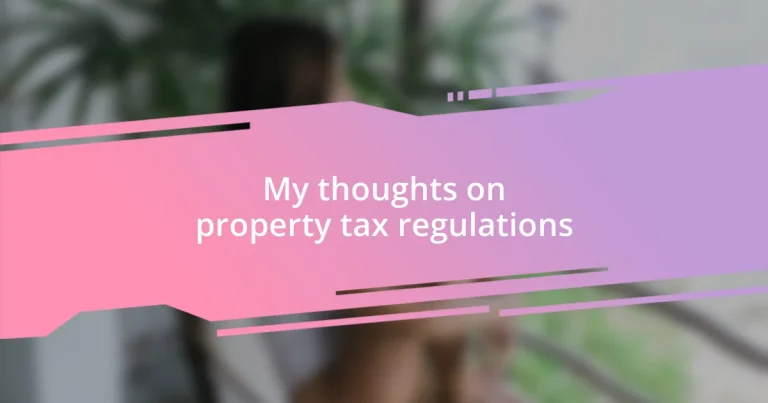Key takeaways:
- Understanding local property tax regulations, including exemptions and deductions, can significantly reduce your tax burden and empower you as a homeowner.
- Property tax compliance is crucial to avoid penalties and contribute to community services, affecting both personal finances and property value.
- Utilizing available resources, such as local assessor websites, community meetings, and professional help, can aid in navigating property tax issues effectively.
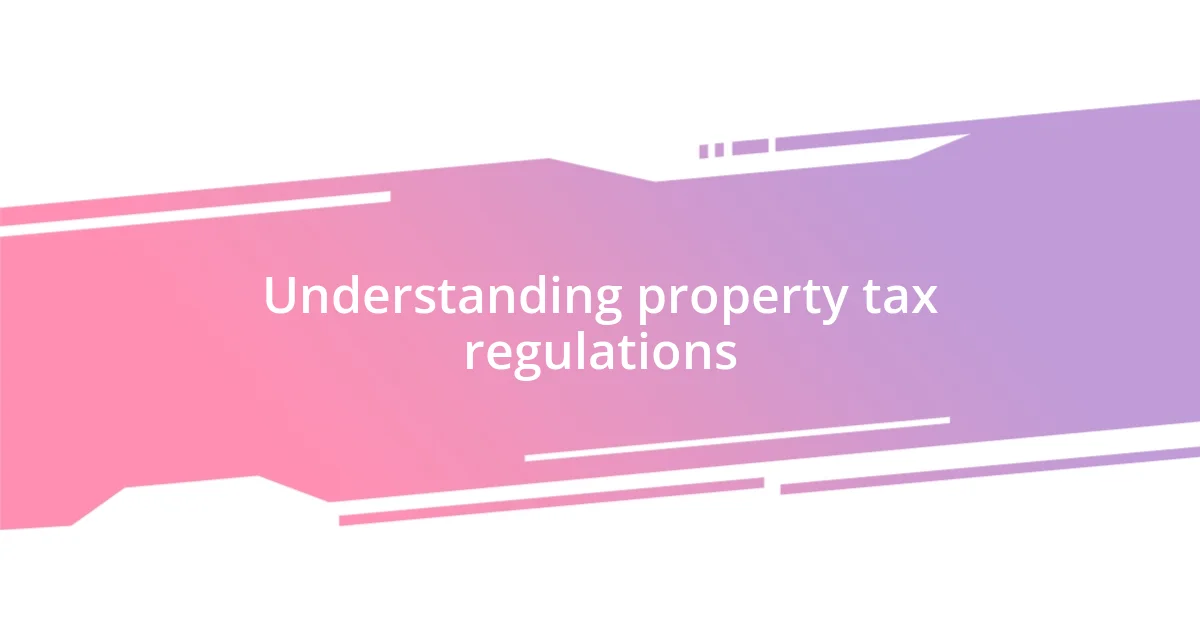
Understanding property tax regulations
Understanding property tax regulations can feel overwhelming, especially if you’re a first-time property owner like I was. I remember the day I received my first tax bill; it hit me like a ton of bricks. Why are these amounts so complicated? Property tax regulations vary widely by location, which can add to the confusion. Each jurisdiction has its specific rules regarding property assessment, exemptions, and rates.
When I delved deeper into my local regulations, I discovered various exemptions available for certain populations, such as seniors or veterans. I was amazed to learn that these could significantly lower my tax burden! It made me wonder—how many people miss out on these benefits simply because they aren’t aware of them? Understanding these nuances not only helped me financially but also empowered me in my role as a homeowner.
I often find myself sharing the complexities of property taxes with friends, realizing that many are just as perplexed as I once was. It’s essential to break down these regulations into digestible pieces. Have you taken the time to explore your own area’s regulations? It’s worth it, as it could potentially save you a significant amount of money in the long run. The more informed you are, the more effectively you can navigate these waters.
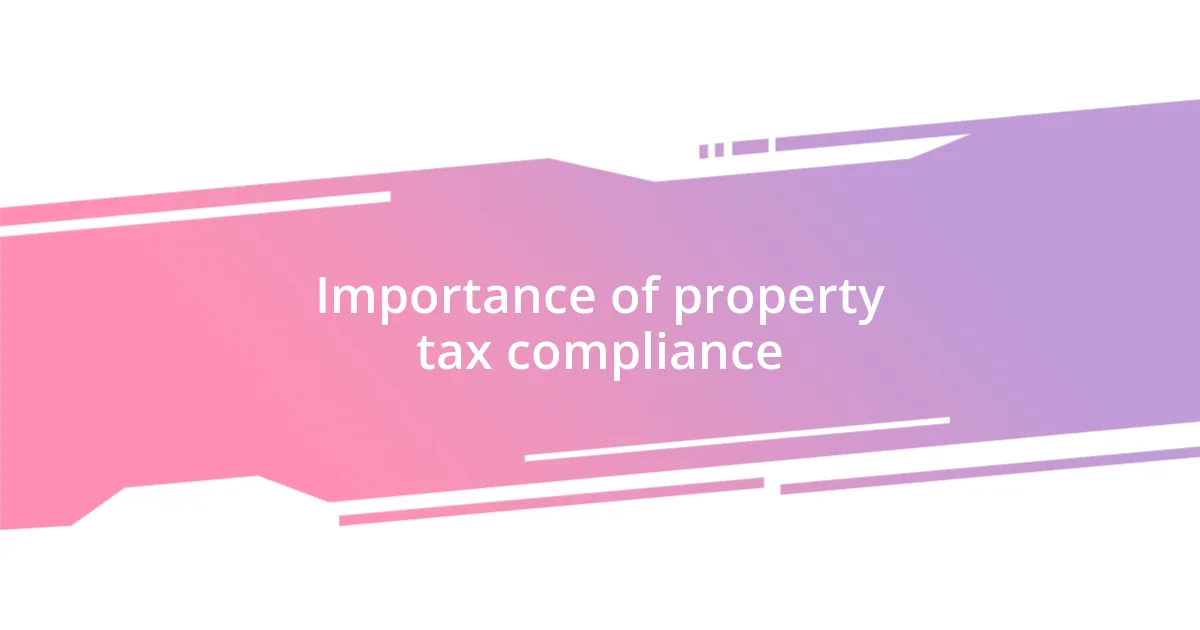
Importance of property tax compliance
Property tax compliance is crucial for any homeowner. I learned this the hard way when I neglected a small payment, only to be greeted by a hefty penalty. The stress of that experience lingered for months; I vowed never to let my tax obligations slip again. Staying compliant helps prevent unnecessary financial burdens that can severely impact your finances and peace of mind.
When you comply with property tax regulations, you not only avoid penalties but also contribute to your community. I remember attending a local town hall meeting, where they discussed how property taxes fund essential services like schools and emergency services. Seeing firsthand where my tax dollars were going shifted my perspective. I realized that compliance isn’t just a personal responsibility, but a communal one that shapes the environment we all live in.
Moreover, being in good standing with property taxes can significantly affect your property’s value. I have a friend who purchased a house in a lovely neighborhood, but his property tax history revealed missed payments from the previous owner. This affected his financing options and insurance rates. It’s a real wake-up call; something as seemingly mundane as timely property tax payments can have lasting implications on your investment.
| Aspect | Importance of Compliance |
|---|---|
| Financial Security | Avoid penalties and extra fees |
| Community Contribution | Supports local services and infrastructure |
| Property Value | Maintains home value and financing options |
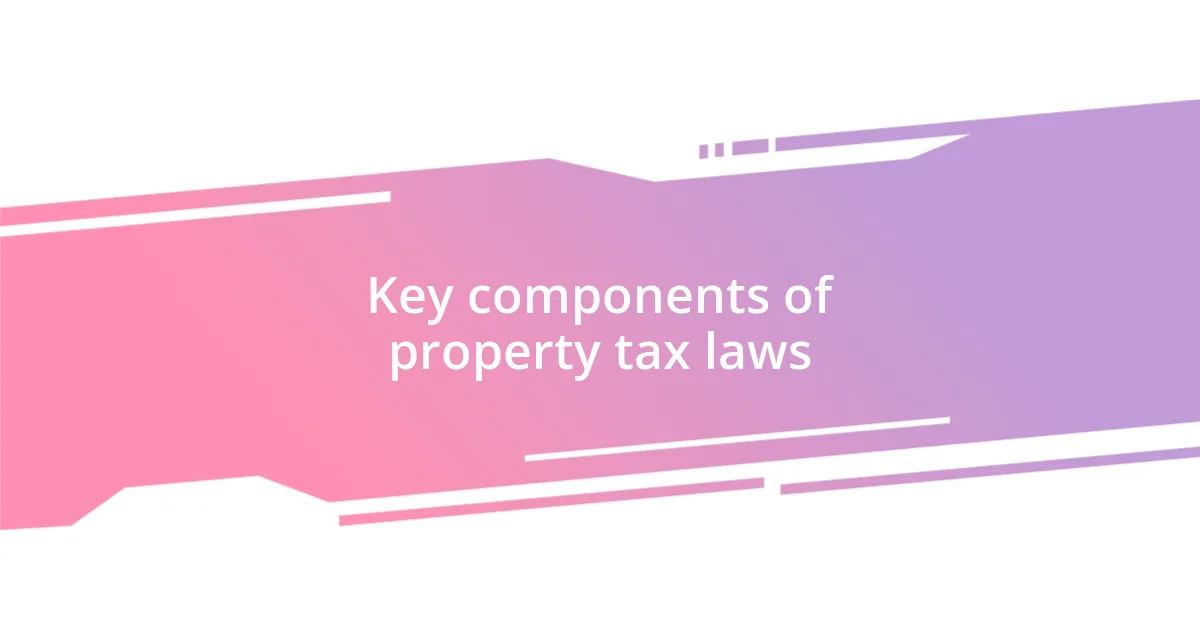
Key components of property tax laws
Property tax laws can seem like a labyrinth at first, but understanding their key components can bring clarity. I recall sifting through those lengthy documents, feeling both intrigued and overwhelmed. I soon realized that familiarizing myself with the various classifications of property was essential. Different types of property—residential, commercial, and industrial—are often assessed at different rates, which can change the overall tax implications significantly.
Here are the key components of property tax laws to keep in mind:
- Assessment Process: Local authorities evaluate the assessed value of the property, determining what you owe based on the market value.
- Tax Rates: Jurisdictions set their rates, and these percentages can vary widely. I often think about how one slight change in rate can impact my budget.
- Exemptions and Deductions: Depending on where you live, exemptions for seniors or disabled individuals can reduce tax liability. Each year, I make sure to check if I qualify for any.
- Appeals Process: If you disagree with your property’s assessed value, you can appeal that decision. I remember feeling empowered when I exercised my right to challenge an assessment.
- Payment Deadlines: Missing payment deadlines can lead to penalties, a lesson I learned the hard way when I mismanaged my calendar.
Navigating these components has helped me feel more in control. Each detail is like a piece of a puzzle, and once you start putting them together, the picture becomes clearer. It’s all about being proactive and engaged with the local regulations, which ultimately benefits both your personal finances and the community as a whole.

How property taxes are assessed
When determining how property taxes are assessed, local governments often look at the property’s “fair market value.” This means they estimate what buyers are willing to pay for similar properties. I remember feeling a knot in my stomach when I learned that a neighbor’s home sold for much higher than I expected—suddenly, my own property’s value was in question! This situation emphasized how market trends can directly affect my tax obligations in ways I hadn’t fully appreciated before.
Assessors use various criteria, such as location, property size, and improvements like renovations or additions to establish this fair market value. I did some digging on my own home’s assessments and discovered that even minor aesthetic changes bumped my value up significantly. It made me wonder, have I really invested wisely, or am I just raising my taxes unconsciously? Understanding these factors not only made me feel more empowered, but it also highlighted the importance of staying informed about the local market’s pulse.
Moreover, I’ve learned that periodic reassessments can lead to fluctuations in property taxes. In my own experience, a surprise hike in the tax assessment left me scrambling to adjust my budget. It’s essential to regularly check if your property’s assessed value aligns with current market conditions; a proactive stance can save you from unexpected financial stress. Isn’t it interesting how much the property tax system is interconnected with our daily lives and decisions?
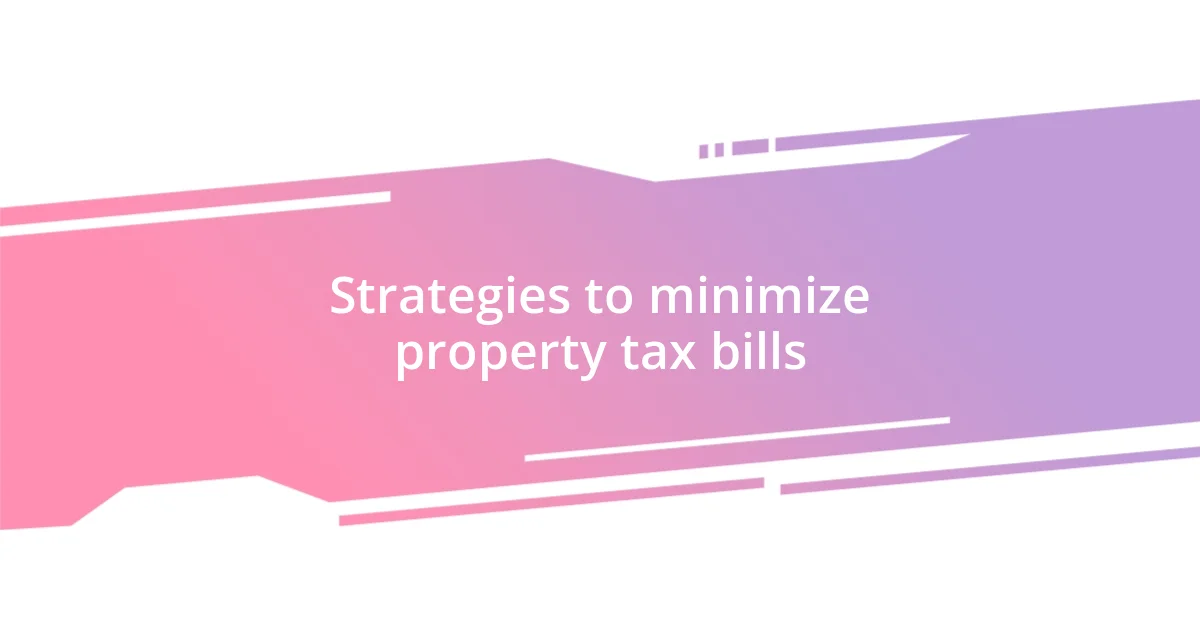
Strategies to minimize property tax bills
One of the most effective strategies I’ve discovered to minimize property tax bills is to stay informed about available exemptions and deductions. For instance, when I found out about my area’s homestead exemption, it felt like a weight had been lifted from my shoulders. Have you checked what might be available in your local jurisdiction? Often, there are benefits for first-time homebuyers or veterans that can significantly lower your taxable amount, so don’t overlook this crucial step.
Another tip I’ve found helpful is to regularly review your property’s assessed value. I remember the rush of adrenaline I felt when I discovered that some neighboring properties had recently sold for less than their assessed value—they were being taxed based on inflated figures! By comparing my assessment with local sales, I realized I could have grounds for an appeal. It’s empowering to take control of your tax situation like this, and sometimes simply voicing your concerns at a public meeting can yield surprising results.
Lastly, I’ve learned the importance of timing your improvements or renovations wisely. There was a time I wanted to add a deck to my home but hesitated because I knew it might increase my property appraisal. Instead of jumping in recklessly, I decided to wait until the next assessment year to undertake the project. Isn’t it fascinating how a little foresight can save you a substantial amount on your taxes? Making strategic decisions can help you navigate the complexities of property tax without sacrificing your dreams for your home.
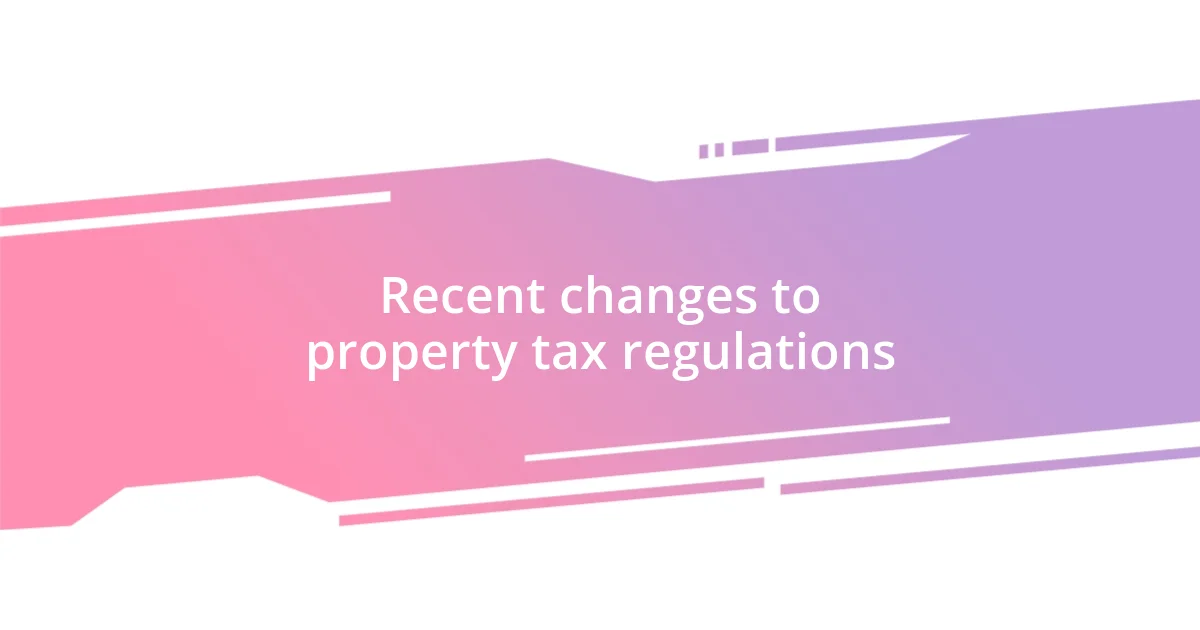
Recent changes to property tax regulations
Recently, there have been significant changes in property tax regulations that have left many homeowners, including myself, feeling a mix of curiosity and concern. For instance, some states have introduced caps on how much property tax assessments can increase annually. This was a relief for me, as I’ve felt the strain of sudden spikes in my tax bill before; I can only imagine the impact it would have on those already living paycheck to paycheck.
In addition to the new caps, the implementation of more transparent assessment processes is something I’ve found quite reassuring. I’ve always thought it a bit daunting—seeing my tax obligations tied to a value I had little insight into. Now, with clearer guidelines and accessible data on how assessments are calculated, I feel more empowered. Have you looked into how these changes might affect your own situation? It’s an excellent opportunity to revisit your home’s value and engage with your local assessors.
Moreover, certain cities have begun offering tax relief programs aimed at low-income residents and seniors, which I think is an essential step towards equity in property taxation. When I hear stories about neighbors struggling to keep their homes due to rising taxes, I can’t help but feel a sense of collective responsibility. I believe we should take advantage of these programs, ensuring that everyone has a fair chance at homeownership, regardless of their financial standing. Isn’t it encouraging to see such measures being put in place for community support?
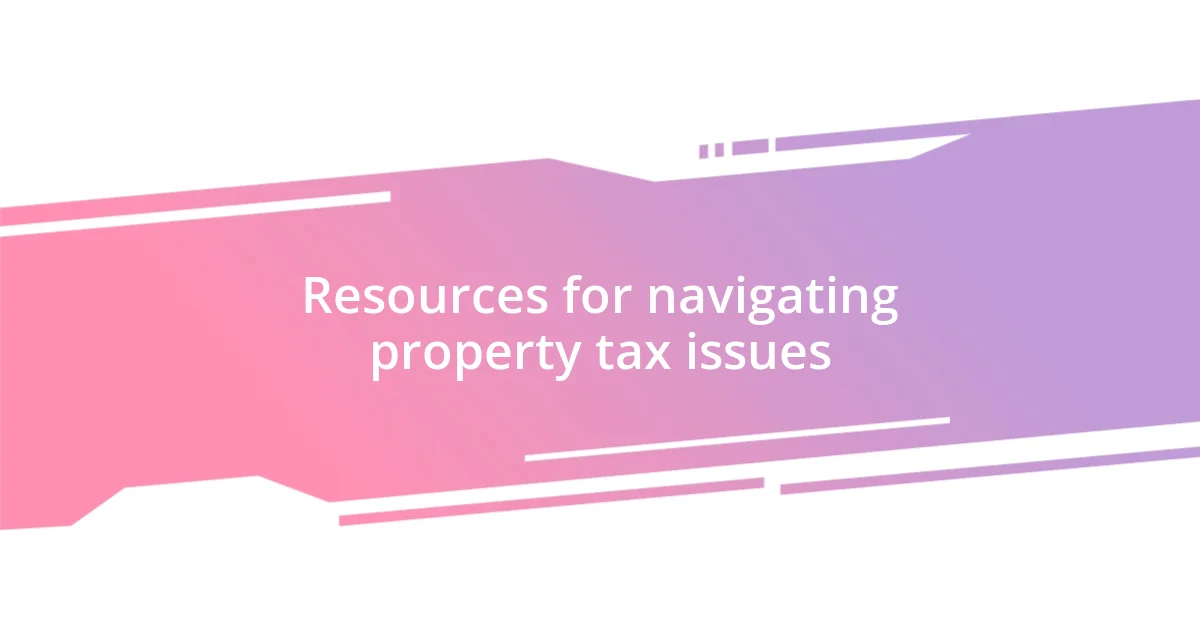
Resources for navigating property tax issues
Navigating property tax issues can be daunting, but there are numerous resources available to help. I once stumbled across my local assessor’s office website, and it was like opening Pandora’s box of information. They had a wealth of resources, including downloadable guides on property assessment and appeals processes. Have you visited your local office online? It’s a goldmine for understanding your rights and how to tackle any issues that arise.
Another valuable tool I’ve found is attending community meetings where tax issues are discussed. I remember feeling a little intimidated the first time I went, but I was pleasantly surprised by how welcoming everyone was. Listening to fellow homeowners share their experiences not only helped me feel less alone but also provided practical advice on navigating challenges specific to my area. Engaging with others in your community can be both informative and empowering.
Lastly, consider seeking help from professionals, such as tax consultants or real estate lawyers. I once consulted a local tax expert when I was confused about the implications of a recent property tax increase. Their insights were invaluable, and it felt reassuring to have someone with expertise on my side. Do you think it might be beneficial for you as well? Sometimes, having that extra support can make a world of difference in dealing with property tax issues.












